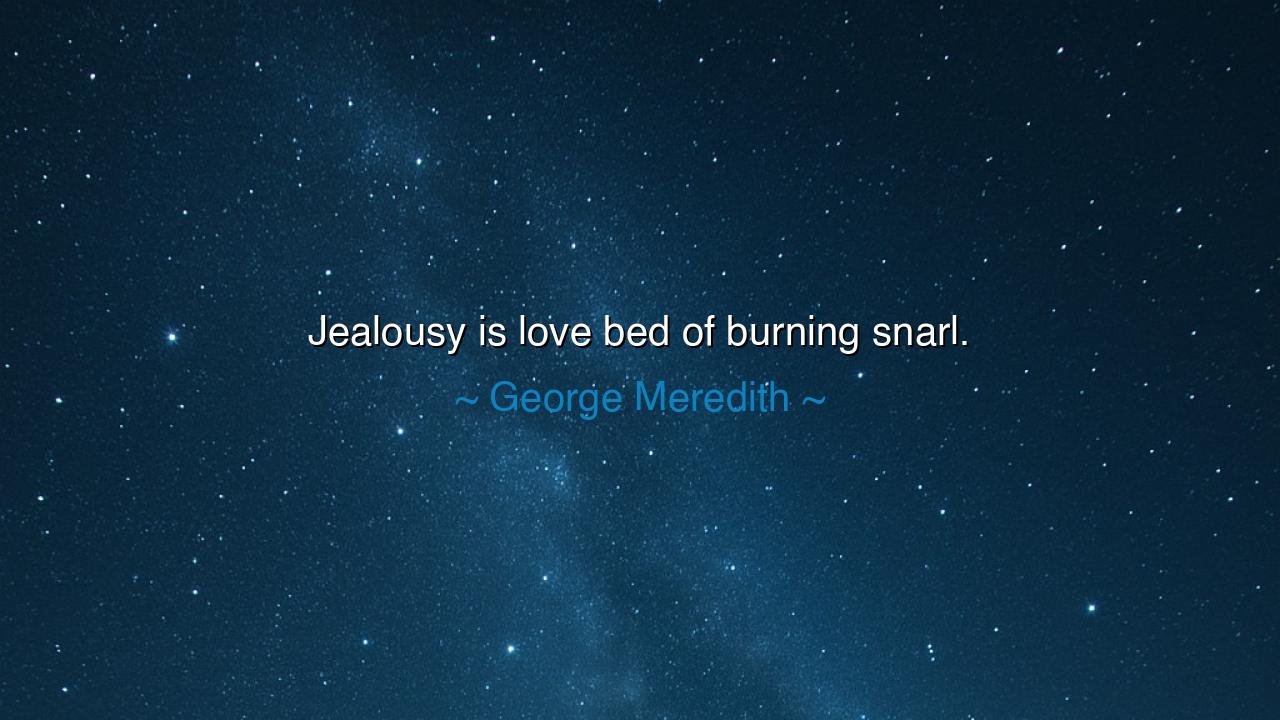
Jealousy is love bed of burning snarl.






In the fierce and poetic words of George Meredith, we find a vision of passion turned to torment: “Jealousy is love’s bed of burning snarl.” It is an image at once beautiful and terrifying — a bed, symbol of warmth and intimacy, now consumed by flame, tangled in the snarl of beasts. Meredith, a Victorian novelist and philosopher of the heart, understood the dual nature of love — that it can give light to the soul, yet, when poisoned by fear and possession, it devours what it once sought to cherish. His words are not mere metaphor; they are a warning from one who gazed deeply into the furnace of human emotion and saw how easily affection can twist into agony.
From the dawn of time, the poets and philosophers have wrestled with the same truth. Love is a noble flame — divine when it illuminates, destructive when it consumes. Jealousy, then, is the moment when love ceases to be a gift and becomes a cage. The one who loves purely seeks the joy of the beloved; the one who loves jealously seeks to own it. Thus, Meredith’s “bed of burning snarl” is no gentle place of repose, but a battlefield where tenderness is strangled by insecurity and fear. It is love sleeping upon coals, too enflamed to rest, too proud to release.
In ancient Greece, they told the story of Hera, queen of the gods, whose beauty and power were unmatched — yet whose heart was forever tormented by jealousy toward her husband’s many loves. Though she was divine, her jealousy drove her to cruelty, to punish mortals and rivals alike. She loved Zeus with a fire that could warm Olympus, yet that same fire burned her from within. Hera’s love was the “bed of burning snarl” Meredith spoke of — fierce, bound to passion, yet suffocated by resentment. Her story stands as an eternal lesson: that even love crowned with divinity can be undone by the poison of comparison and possession.
Meredith, living in the restless age of the nineteenth century, saw jealousy not only as an emotion but as a mirror of the human struggle — the tension between the spiritual and the animal within us. When he speaks of a “snarl,” he evokes the beastly growl that hides beneath the human heart. Jealousy is not born of love’s purity, but of its distortion. It is love mixed with pride, love shadowed by fear, love that has forgotten trust. Where true love frees, jealousy binds. Where love delights in another’s joy, jealousy resents it. The heart that succumbs to jealousy forgets that love is not possession, but recognition — the soul seeing itself reflected in another and rejoicing without demand.
Consider the tragic tale of Othello, the noble Moor of Venice. His love for Desdemona was vast, but it was not serene. Into that love, jealousy crept like smoke, whispered into his ear by deceit, until the flame of devotion became the fire of destruction. Othello’s heart became Meredith’s “bed of burning snarl” — a tangle of suspicion, rage, and wounded pride. The man who once adored with reverence came to destroy what he cherished most. His tragedy teaches us that jealousy, once kindled, consumes both the lover and the beloved, leaving behind only ashes of what might have been peace.
There is great wisdom in Meredith’s imagery. He does not say jealousy kills love, but that it lies within it, coiled and waiting. For every heart that loves has within it the potential for jealousy — the instinct to protect, to fear loss, to measure one’s worth against another’s gaze. Yet the wise learn to temper that fire with faith, to see jealousy not as proof of love, but as its corruption. One must learn to love without clutching, to desire without demanding, to cherish without controlling. Only then does love become a place of rest, not a bed of flames.
The lesson of this quote, passed down through time, is thus: guard your heart not from love, but from the shadows that stalk behind it. When the heat of jealousy rises, pause and ask — “Do I fear losing love, or losing control?” The first is human; the second is the path to ruin. Choose trust over suspicion, gratitude over comparison. Speak openly, love freely, and let your affection breathe. For the moment you clutch too tightly, the flame that once warmed will burn.
And so, my listener, remember George Meredith’s warning: love is sacred, but fragile. It can be a garden or a furnace, a song or a snarl. The difference lies in the heart that tends it. Keep your love untainted by jealousy, and it will illuminate your life like a calm and steady flame. But let envy enter, and that same flame will consume you. Choose, therefore, to make of your heart not a bed of burning snarl, but a hearth of gentle fire — where warmth lives, and no shadow reigns.






AAdministratorAdministrator
Welcome, honored guests. Please leave a comment, we will respond soon